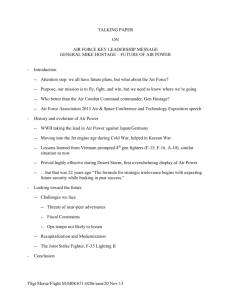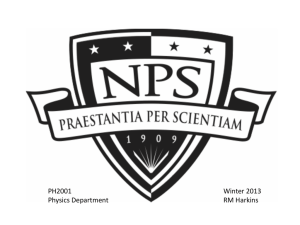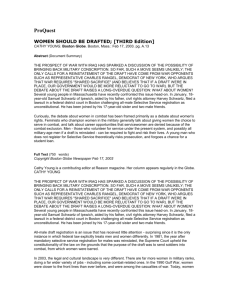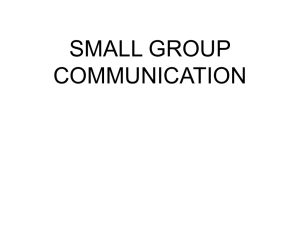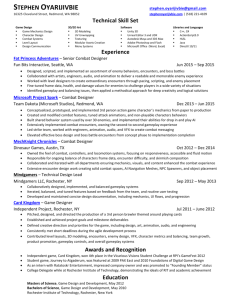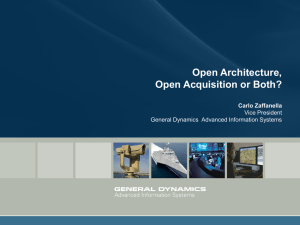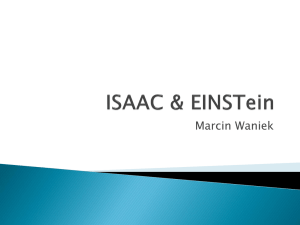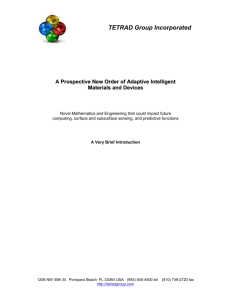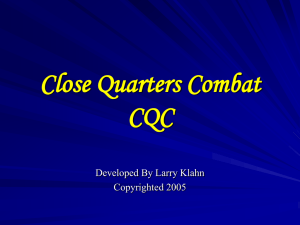ESR-57xxP
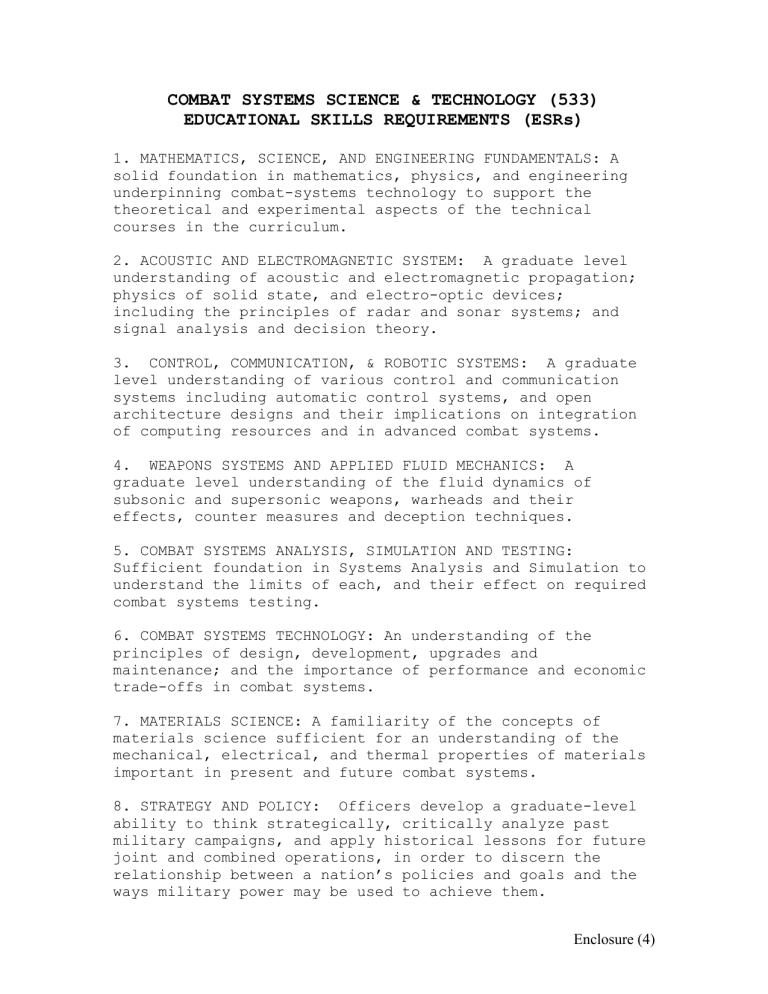
COMBAT SYSTEMS SCIENCE & TECHNOLOGY (533)
EDUCATIONAL SKILLS REQUIREMENTS (ESRs)
1. MATHEMATICS, SCIENCE, AND ENGINEERING FUNDAMENTALS: A solid foundation in mathematics, physics, and engineering underpinning combat-systems technology to support the theoretical and experimental aspects of the technical courses in the curriculum.
2. ACOUSTIC AND ELECTROMAGNETIC SYSTEM: A graduate level understanding of acoustic and electromagnetic propagation; physics of solid state, and electro-optic devices; including the principles of radar and sonar systems; and signal analysis and decision theory.
3. CONTROL, COMMUNICATION, & ROBOTIC SYSTEMS: A graduate level understanding of various control and communication systems including automatic control systems, and open architecture designs and their implications on integration of computing resources and in advanced combat systems.
4. WEAPONS SYSTEMS AND APPLIED FLUID MECHANICS: A graduate level understanding of the fluid dynamics of subsonic and supersonic weapons, warheads and their effects, counter measures and deception techniques.
5. COMBAT SYSTEMS ANALYSIS, SIMULATION AND TESTING:
Sufficient foundation in Systems Analysis and Simulation to understand the limits of each, and their effect on required combat systems testing.
6. COMBAT SYSTEMS TECHNOLOGY: An understanding of the principles of design, development, upgrades and maintenance; and the importance of performance and economic trade-offs in combat systems.
7. MATERIALS SCIENCE: A familiarity of the concepts of materials science sufficient for an understanding of the mechanical, electrical, and thermal properties of materials important in present and future combat systems.
8. STRATEGY AND POLICY: Officers develop a graduate-level ability to think strategically, critically analyze past military campaigns, and apply historical lessons for future joint and combined operations, in order to discern the relationship between a nation’s policies and goals and the ways military power may be used to achieve them.
Enclosure (4)
9. TECHNICAL SPECIALIZATION: Each officer will also acquire technical competence in one or more of the following areas as it pertains to Combat Systems:
ELECTROMAGNETIC SYSTEMS, WEAPONS & EFFECTS, PHYSICS,
UNDERWATER ACOUSTIC SYSTEMS, OR A SPECIFIC ENGINEERING
DISCIPLINE. The knowledge required for an approved concentration is:
A. ELECTROMAGNETIC SYSTEMS (5701)
1) Propagation and scattering of optical, IR, and microwave radiation in the turbulent atmosphere as they influence target detection.
2) Advanced sensor and detection techniques for military applications.
3) Advanced concepts of target surveillance, acquisition, and engagement.
B. WEAPONS & EFFECTS (5702)
1) Molecular energetics and detonation physics.
2) Impact phenomena. Fragmentation and rod-like projectile penetration.
3) Warhead design and lethality considerations; target vulnerability and survivability consideration; kill probability.
4) Principles of directed energy weapons systems and their effects.
5) Electric ship weapon systems.
C. PHYSICS (5703)
1) Statistical physics
2) Advanced E&M radiation
3) Advanced Quantum Mechanics
D. UNDERWATER ACOUSTIC SYSTEMS (5704)
1) Wave propagation in the ocean; scattering, fluctuations and boundary interactions as they effect detection, localization, and prosecution of underwater targets; underwater transducer design and array theory.
2) Active and passive acoustic signal processing for detection of submarines, mines, and other underwater weapons; adaptive techniques.
3) Acoustic influences of oceanographic phenomena, which effect target detection including boundary characteristics, ambient noise, sound speed profiles, fronts, and eddies.
Enclosure (4)
E. TOTAL SHIP SYSTEMS ENGINEERING (5705)
1) Power systems
2) Naval architecture and ship design
3) Shipboard combat systems
4) Integration issues
F. SOFTWARE ENGINEERING (5707)
1) Software requirements
2) Software design issues
3) Software testing and safety
G. ENGINEERING DISCIPLINE (5700)
A series of at least five graduate-level courses in an area related to combat systems in the disciplines of
Engineering (Mechanical, Electrical, Aeronautical, or
Space Systems). This series must be approved by the
Program Officer.
10. THESIS: The graduate will demonstrate the ability to conduct independent research in combat systems sciences and technology and proficiency in presenting the results in writing and orally by means of a thesis and commandoriented briefing.
Enclosure (4)
